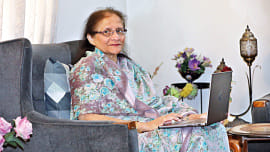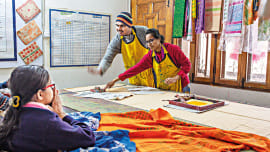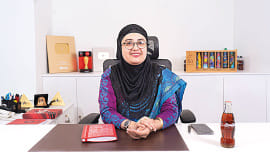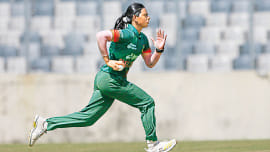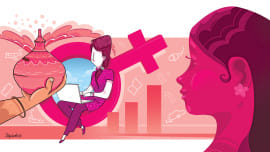International Women’s Day / Coding a new path
7 March 2024, 18:00 PM
Invest in women
International Women’s Day / Navigating life as a woman living alone
7 March 2024, 18:00 PM
Invest in women
International Women’s Day / Invest in women: Accelerate progress
7 March 2024, 18:00 PM
Invest in women
Coca-Cola’s commitment to gender diversification in Bangladesh
7 March 2024, 18:00 PM
Invest in women
Balancing the sporting scales: Still miles to go
7 March 2024, 18:00 PM
Invest in women
International Women’s Day / Driving equality
7 March 2024, 18:00 PM
Invest in women
Coding a new path
"While delivering a presentation to a multinational company, I concluded the discussion, and a company officer inquired, “Madam, how did you enter into the men's world?” “This moment unfolded in an office where I was the sole woman amidst a male-dominated environment," recounted Shaheda Mustafiz, the trailblazing first woman programmer in Bangladesh. Her anecdote sheds light on the challenges women faced in the IT sector in Bangladesh during that period.
7 March 2024, 18:00 PM
Navigating life as a woman living alone
On my way to work last Tuesday, my thoughts meandered towards the hypothetical comfort of living with my parents, enjoying the reassurance of my mother’s breakfast preparations and my father’s unwavering support, shielding me from financial worries until my university days were behind me. These contemplations stirred a tumult of emotions within me throughout the day, prompting a deep reflection on the challenges and pleasures of navigating life alone, particularly as a woman.
7 March 2024, 18:00 PM
Invest in women: Accelerate progress
Investing in women’s empowerment is crucial for societal transformation, especially in Bangladesh’s unique socio-economic landscape. As we strive for progress, prioritizing women’s advancement isn’t just ethical but necessary for lasting development. However, the global deficit in financing gender equality poses a significant challenge, including in Bangladesh. As we approach International Women’s Day 2024, the call to ‘Invest in Women: Accelerate Progress’ grows stronger
7 March 2024, 18:00 PM
Coca-Cola’s commitment to gender diversification in Bangladesh
Coca-Cola strives for a gender-equal workplace and world. The company believes that investing in and empowering women not only directly benefits them, but also the business and communities.
7 March 2024, 18:00 PM
Balancing the sporting scales: Still miles to go
The sporting world in the past decade has witnessed a paradigm shift when it comes to the women’s circuit. In between came the coronavirus pandemic but the uprising proceeded nonetheless.
7 March 2024, 18:00 PM
Driving equality
Gender responsive finance in Bangladesh has increased significantly over the last decade in both the public and private sectors, portraying a favourable shift toward ending the gender gap.
7 March 2024, 18:00 PM
